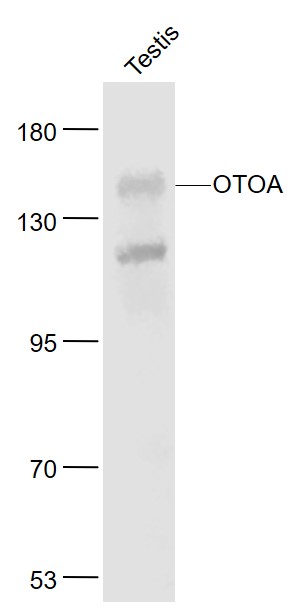Product Name :
OTOA Polyclonal Antibody Background :
Otoancorin, also known as OTOA, CT108 or DFNB22, is a 1,153 amino acid protein belonging to the stereocilin family. Expressed in the inner ear and restricted to the interface between the apical surface of sensory epithelia, otoancorin is suggested to act as an adhesion molecule. Otoancorin ensures the attachment of the inner ear acellular gels to the apical surface of the underlying nonsensory cells. Mutations in the gene encoding otoancorin leads to deafness autosomal recessive type 22 (DFNB22), which is a form of sensorineural hearing loss. Sensorineural deafness results from damage to the neural receptors of the inner ear, the nerve pathways to the brain or the area of the brain that receives sound information. Existing as three alternatively spliced isoforms, otoancorin is encoded by a gene located on human chromosome 16p12.2. Product :
0.01M TBS(pH7.4) with 1% BSA, 0.03% Proclin300 and 50% Glycerol. Storage&Stability :
Store at 4°C short term. Aliquot and store at -20°C long term. Avoid freeze-thaw cycles. Specificity :
OTOA Polyclonal Antibody detects endogenous levels of OTOA protein. Immunogen :
KLH conjugated synthetic peptide derived from human OTOA/DFNB22 Conjugate :
Unconjugated Modification :
Unmodification
OTOA Polyclonal Antibody Background :
Otoancorin, also known as OTOA, CT108 or DFNB22, is a 1,153 amino acid protein belonging to the stereocilin family. Expressed in the inner ear and restricted to the interface between the apical surface of sensory epithelia, otoancorin is suggested to act as an adhesion molecule. Otoancorin ensures the attachment of the inner ear acellular gels to the apical surface of the underlying nonsensory cells. Mutations in the gene encoding otoancorin leads to deafness autosomal recessive type 22 (DFNB22), which is a form of sensorineural hearing loss. Sensorineural deafness results from damage to the neural receptors of the inner ear, the nerve pathways to the brain or the area of the brain that receives sound information. Existing as three alternatively spliced isoforms, otoancorin is encoded by a gene located on human chromosome 16p12.2. Product :
0.01M TBS(pH7.4) with 1% BSA, 0.03% Proclin300 and 50% Glycerol. Storage&Stability :
Store at 4°C short term. Aliquot and store at -20°C long term. Avoid freeze-thaw cycles. Specificity :
OTOA Polyclonal Antibody detects endogenous levels of OTOA protein. Immunogen :
KLH conjugated synthetic peptide derived from human OTOA/DFNB22 Conjugate :
Unconjugated Modification :
Unmodification
-
 Sample: Testis (Mouse) Lysate at 40 ug Primary: Anti-OTOA at 1/1000 dilution
Sample: Testis (Mouse) Lysate at 40 ug Primary: Anti-OTOA at 1/1000 dilution
Bioworld Biotech only provide peptides for our antibodies and do not provide additional peptide customization services.
Price/Size :
USD 368/1mg/vial
Tips:
For phospho antibody, we provide phospho peptide(0.5mg) and non-phospho peptide(0.5mg).Describe :
Blocking peptides are peptides that bind specifically to the target antibody and block antibody binding. These peptide usually contains the epitope recognized by the antibody. Antibodies bound to the blocking peptide no longer bind to the epitope on the target protein. This mechanism is useful when non-specific binding is an issue, for example, in Western blotting (WB) and Immunohistochemistry (IHC). By comparing the staining from the blocked antibody versus the antibody alone, one can see which staining is specific; Specific binding will be absent from the western blot or IHC performed with the neutralized antibody.Formula:
Synthetic peptide was lyophilized with 100% acetonitrile and is supplied as a powder. Reconstitute with 0.1 ml DI water for a final concentration of 10 mg/ml.The purity is >90%,tested by HPLC and MS.
Storage:
The freeze-dried powder is more stable. For short time at 2-8°C. For long term storage store at -20°C.
Note :
This product is for research use only (RUO only). Not for use in diagnostic or therapeutic procedures.
 OTOA Polyclonal Antibody
OTOA Polyclonal Antibody  Datasheet
Datasheet COA
COA MSDS
MSDS SHIP
SHIP